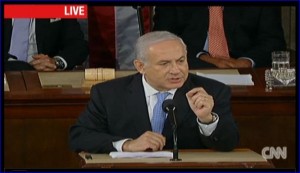
To Israeli Prime Minister Benjamin Netanyahu, a U.S. election is a race Israel should try to win.
As someone who spent many of his young years in the United States, both as a student and as a representative of Israel in Washington and at the United Nations, Mr. Netanyahu knows U.S. politics well and he’s very good at exploiting it.
His recent heavy-handed campaign to have the Obama administration declare a “red line,” or ultimatum, in U.S. efforts to prevent Iran from acquiring nuclear weapons is a case in point.
Not only does the Israeli leader expect to advance his country’s interests by safeguarding it from possible nuclear attack, but, in this case, he hopes to have an effect on the U.S. election in the process.
The idea of an ultimatum is not a new concept, but it’s one that U.S. President Barack Obama wants to avoid.
No leader wants to have his hands tied, U.S. Secretary of Defence Leon Panetta told an Israeli interviewer Friday. “Red lines … are a kind of political argument … used to put people in a corner,” he said.
But Mr. Netanyahu knows that President Obama is sensitive about losing Jewish votes. While most Jewish Americans cast their ballots for Democrats, the U.S. Jewish community is increasingly critical about U.S. policy in the Middle East.
“There is no illusion that [Mr. Netanyahu] can determine who will win the election,” said Barry Rubin, an American-born Israeli and director of the Global Research in International Affairs Center in Israel. “He’s using the leverage he has to further his own agenda.”
Mr. Netanyahu doesn’t take “no” for an answer, but keeps hammering his point, even to the extent that many in his own party think he risks harming permanent relations between the two countries.
“The public conflict with the American administration weakened Israel’s deterring power,” wrote a leading Israeli journalist, Nahum Barnea, in the weekend’s Yedioth Ahronoth newspaper.
It “got the state involved, against its better interests, in the U.S. elections race; caused unnecessary economic and political damage; and did not in any way advance the struggle to stop Iran.”
That is not how Mr. Netanyahu sees things.
“I’ve been saying these things [about Iran] for 16 years,” said Mr. Netanyahu in a weekend interview to mark the Jewish New Year. “In the beginning, I was almost alone when I warned of the danger, and then others joined me.
“If for 16 years I had listened to those who said, ‘It is not appropriate,’ or, ‘This isn’t the time’ … I don’t know if we would have made it to here,” he said.
For Mr. Obama, it’s gotten so that he’s damned if does and damned if he doesn’t give in to the pressure. If he yields, many will brand him as weak; should he refuse, he risks alienating pro-Israel voters who agree with Mr. Netanyahu.
The same goes for another trick Mr. Netanyahu had up his sleeve last week, when Mr. Obama reportedly declined to schedule a meeting with the Israeli leader when he visits the United States next week to attend the United Nations General Assembly.
It seems U.S. officials worried a meeting could produce another humiliating public lecture by Mr. Netanyahu as occurred at the White House last year.
A sitting president “does not take such risks on the eve of elections,” explained Mr. Barnea, who also wrote that it was Mr. Netanyahu who told his aides to leak to the press the idea that Mr. Obama was refusing to meet.
As for Mr. Netanyahu affecting the U.S. election, observers note that the Jewish vote, even in swing states such as Pennsylvania and Florida, is so small that no stampede of Jewish voters could swing the state one way or the other.
True, but Mr. Netanyahu achieves a desired effect in other ways. For one thing, his statements portray Mr. Obama as weak, something that plays to the argument made by Republican presidential candidate Mitt Romney, a long-time friend of the Israeli leader.
More than that, Mr. Netanyahu’s strategy is to appeal to more than just the Jewish voters; it is also to reach evangelical Christians whose numbers are several times the size of the Jewish community.
“Netanyahu began an assiduous courtship of the Christian right in the mid-nineties,” said Gershom Gorenburg, another U.S.-born Israeli and author of The End of Days:Fundamentalism and the Struggle for the Temple Mount.
While many of the evangelical Christians are inclined to support Republican candidates, their voter turnout rate is often quite low. Mr. Netanyahu hopes to inspire more of them to get out and vote, said Mr. Gorenburg.
Of course, this isn’t the first time that U.S. and Israeli leaders have tangled. Jimmy Carter and Menachem Begin had serious differences, and James Baker, secretary of state for George H.W. Bush, admitted years after the fact that Washington had worked hard to ensure the defeat of Yitzhak Shamir in 1992.
Mr. Obama isn’t the first president with whom Mr. Netanyahu has battled. During his first term as prime minister in the 1990s, Mr. Netanyahu caused then-president Bill Clinton enormous headaches.
Clinton adviser Aaron David Miller recalled the first time the two leaders met: An exasperated Mr. Clinton left the meeting, railing about the impudence of Mr. Netanyahu. “Just who,” the president asked his stunned aides, “is the … superpower here?”

PATRICK MARTIN, The Globe and Mail
